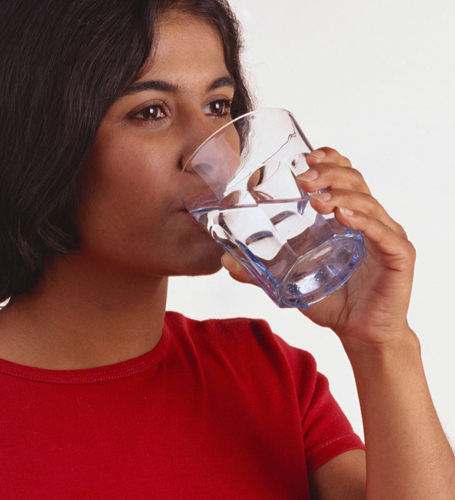|
As a new mom, you’ll need to make sure that you get plenty of fresh, wholesome food to keep your energy levels high. Eating well also helps to ensure that your breastfed baby will have a constant supply of good-quality milk to keep him healthy and satisfied.

| Q: |
How many calories do I need when I’m breastfeeding?
| | A: |
Most women need at least 2,200 calories per day to maintain a
supply of good-quality milk, but if you are active, over- or
underweight, your needs may be different. Exclusive breastfeeding burns
around 300–500 calories per day, and in most cases these need to be
replaced. But listen to your body—some days you may need to eat more.
|
| Q: |
Is it OK to diet while breastfeeding?
| | A: |
This is never a good idea; you need a balanced diet and adequate
calories to produce enough good-quality milk for your baby. Also, toxins
are stored in fat cells in your body, and when you diet, these are
released into your bloodstream and into your milk, eventually reaching
your baby. While breastfeeding, you can lose weight healthily (about
5lb/2kg a month) by eating plenty of fresh, whole foods and giving up
refined goodies.
|
| Q: |
Which foods should I try to include in my diet while breastfeeding and why?
| | A: |
A balanced diet will help to ensure that your baby gets the
nutrients she needs from your milk, and that you stay healthy, relaxed,
and full of energy.
Aim for a diet that is
high in unrefined carbohydrates (whole-grain breads, pastas, cereals,
brown rice, and grains), which will provide you with sustainable energy
and fiber to encourage healthy digestion. Pulses like beans, peas, and
chickpeas, are an excellent source of healthy unrefined carbs, fiber,
vitamins, minerals, and protein. Lentils and chickpeas, in particular,
are rich in iron, which can be low in breastfeeding moms. You’ll also
find iron in dried fruit, fish, and leafy greens, but red meat has the
best and most easily absorbed form. Essential fatty acids, found in oily
fish, nuts, and seeds, encourage optimum health for you, but they’ll
also help ensure that your baby grows and develops properly—in
particular, her brain and nervous system. Fresh vegetables and fruit are
essential for the vitamins, minerals, and fiber they offer. Finally,
aim for four servings of calcium—found in dairy products, soy, and leafy
greens—and three or four servings of protein a day (in lean meats,
fish, pulses, eggs, seeds, nuts, and soy).
|
| Q: |
Are there any foods I should avoid while breastfeeding?
| | A: |
Breast milk is a sweet, nutritious food that takes on the flavors
of the foods you are eating, giving your baby her first tastes of food.
There are no foods that need to be avoided, but keep an eye out for
those that may cause her discomfort. If she appears to be uncomfortable
after feeds, crying, vomiting, drawing her knees up to her chest, or
experiencing gas it may well be that something you have eaten doesn’t
agree with her. Removing the offending food should make a difference
instantly.
Many believe that the
foods in a breastfeeding mom’s diet can cause colic. Although no one is
exactly sure what causes colic, as the symptoms and causes differ
between babies, lots of moms swear by cutting out gas-producing foods
such as cabbage, onions, garlic, and brussel sprouts.
All studies suggest
that what you eat while breastfeeding makes no difference to later
allergic disease, including food allergies. However, official advice in
the US and UK is that mothers may wish to avoid peanuts during both
pregnancy and breastfeeding, and to avoid giving infants peanuts for the
first three years of their life. This remains contentious and is under
review.
|
| Q: |
I find breastfeeding very draining; is there something that I should be eating to lift my energy levels?
| | A: |
Look at the type of carbohydrates you are eating. If they are
mostly “quick-release,” you’ll experience a surge of energy, followed by
a slump that will leave you feeling weary and drained. So go for
slow-release carbs, such as whole grains, pulses, seeds, nuts, and dried
fruit, and if you do have unrefined foods in your diet, such as white
rice, bread or pasta, cakes, and cookies, eat them with a little protein
to slow down their transit into your blood stream. An egg on white
toast or some cheese on pasta can make all the difference. Make sure you
are getting plenty of iron too. Iron-deficiency anemia is common in
pregnancy and during the postnatal period, and can leave you feeling
exhausted. It can help to drink a little fruit juice with iron-rich
foods, to encourage their absorption. If all else fails, see your
doctor.
|
Did you know…
that when you’re
breastfeeding you need to make sure you drink between 8 to 12 glasses
(2.5 and 3 liters) of fluids a day? Breastfeeding requires a lot of
liquid, and if you become dehydrated, you’ll feel tired and probably
irritable or tearful too. It’s a good idea to have some water or fresh
fruit juice by your side before you settle down to breastfeed.

|